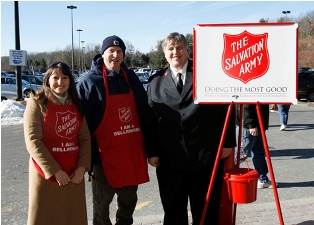The Salvation Army—Naughty or Nice?
By Tony Peregrin in News on Nov 29, 2010 5:00PM
 The corner Santa with his red kettle and brass bell are a familiar and friendly sight this time of year, but the Salvation Army’s anti-gay position doesn’t exactly ring true for many gays and lesbians and their allies.
The corner Santa with his red kettle and brass bell are a familiar and friendly sight this time of year, but the Salvation Army’s anti-gay position doesn’t exactly ring true for many gays and lesbians and their allies.
According to gay rights activists, the Salvation Army, known for its homeless shelters, thrift stores and, yes, holiday bell ringers, has had a long history of homophobia. Andy Thayer, co-founder of the Gay Liberation Network, pointed to the Salvation Army’s official policy statement on homosexuality as a clear indication of how the organization views same-sex relationships. In the statement, the Salvation Army defines marriage “as a gift of God to be enjoyed within the context of heterosexual marriage.” It also states that “scripture forbids sexual intimacy between members of the same sex,” and that gays and lesbians “are called upon to embrace celibacy as a way of life.” The statement is supported by a number of passages from the Bible, including Leviticus, which at certain points state that gay people should be killed.
“The Salvation Army is in the closet about these policies,” says Thayer. “If a racist organization was trying to collect money with the message that some of the money was going towards doing good, would you support them? I would hope not.”
“This comes up from time to time, and I really feel it is one of the topics about which the Salvation Army is most misunderstood,” explained Jeffrey Curnow, public and corporate relations manager for the Salvation Army, via e-mail. “I appreciate the opportunity to correct the record when it does come up. In fact, the Salvation Army serves countless people across the country every day from any variety of backgrounds, including gays and lesbians. This number probably reaches into the thousands, though it is impossible for us to determine, primarily because we would simply never ask about a person’s sexual identity.”
“Because The Salvation Army is a church we do have theological positions on a variety of topics,” said Curnow. “These positions are intended for our church members or those who are interested in our church. Just as you wouldn’t expect everyone you meet to share all your ideas or beliefs, we would never expect everyone we help, our donors, or even our non-church-member employees to necessarily agree with these theological positions.”
“The Salvation Army can come out with any boilerplate statements they want to,” says Thayer. “What if someone, say a homeless person that happens to be gay, or a gay teen in the closet wanted to access services offered by the Salvation Army? Would they truly feel comfortable going to an anti-gay outfit to get aid? You can say you are the nicest Christian organization in the world, but if you are sending a message that some people are more equal than others—that is not acceptable.”
According to Thayer, financial support for the Salvation Army goes beyond throwing coins into a kettle. “Our tax dollars are often going to anti-gay, faith-based charities when there are plenty of legitimate, pro-LGBT organizations out there in Chicago that are doing just as much good without spreading discrimination. Take Howard Brown, for example. You can walk in to Howard Brown Health Center and leave your donation in the can at the front desk. Or you can donate to the American Red Cross, or the Trevor Project, or countless other organizations that do not discriminate.”